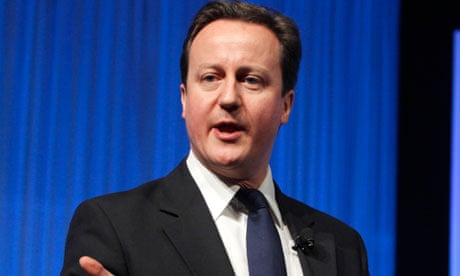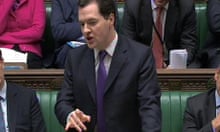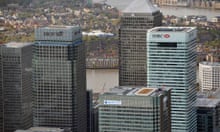Financiers in the City of London provided more than 50% of the funding for the Tories last year, new research has revealed, prompting claims that the party is in thrall to the banks.
A study by the Bureau for Investigative Journalism has found that the City accounted for £11.4m of Tory funding – 50.79% of its total haul – in 2010, a general election year. This compared with £2.7m, or 25% of its funding, in 2005, when David Cameron became party leader.
The research also shows that nearly 60 donors gave more than £50,000 to the Tories last year, entitling each of them to a face-to-face meeting with leading members of the party up to and including Cameron.
The study shows the impact that Michael Spencer has had on party funding. He was appointed by Cameron as Tory treasurer in an attempt to reduce the influence of Lord Ashcroft, the party's former deputy chairman. Spencer was asked by Cameron to increase the number of relatively small donations of £50,000 to curb the influence of large donors such as Ashcroft, and for these smaller donations the City was place to look.
But there were still big City donations last year. David "Spotty" Rowland gave more than £4m. Stanley Fink, a hedge fund manager who was appointed the Tory treasurer last year in succession to Spencer, gave £1.9m while George Magan gave £485,000. Magan was also given a peerage.
The research comes at an awkward time for the coalition. Yesterday, George Osborne put an extra £800m tax on bank balance sheets for this year, increasing the bank levy from £1.7bn to £2.5bn. The move was immediately denounced by unions as being politically motivated, coming as it did just hours before Osborne's first encounter with the new shadow chancellor, Ed Balls, in the Commons.
In parliament, Balls lambasted Osborne for making the announcement about the levy at breakfast time, rather than in next month's budget, describing it as a "mini budget". He also said that even without the increased bank levy, Osborne had cut tax for banks this year because he had not reintroduced Labour's bank bonus tax and was also cutting corporation tax.
Osborne, however, was adamant that banks would pay more tax under the coalition than they would have done under Labour and insisted that he would not sign an agreement with the banks until he thought he had a "good" deal.
Meanwhile, the government and the banks are continuing talks over an agreement on bankers' bonuses and lending. An agreement on the so-called Project Merlin is to be announced within the "next week", Treasury officials said.
In response to the news of City donations to the party, John Cryer, a member of the Treasury select committee, said: "With over half of Conservative party funds coming from the City, it's no wonder this Tory-led government is letting the banks off the hook. George Osborne is giving the banks a tax cut compared to last year and is refusing to adopt Labour's plan to repeat last year's £3.5bn bank bonus tax as well as the bank levy. Even with yesterday's panic announcement the Tory-led government is taking less from the banks than the Labour government did last year. And there is still no sign of a deal on increased bank lending, greater transparency and restraint on bonuses. People will now suspect that the real reason why George Osborne has been so soft is that he cannot afford to upset his paymasters."
A Tory party spokesman said: "On the very day that the chancellor raised another £800m in tax from bankers – having already introduced the toughest rules on bankers' pay anywhere in the developed world – it beggars belief that anyone could claim that donors to the Conservatives are influencing policy. It would be more pertinent to ask why Labour continue to allow their policy to be dictated by the unions, who provide 80% of their funds."
Labour saw its business donations plummet after Tony Blair left and Gordon Brown struggled in the polls. Unions account for most of the party's funding.





Comments (…)
Sign in or create your Guardian account to join the discussion